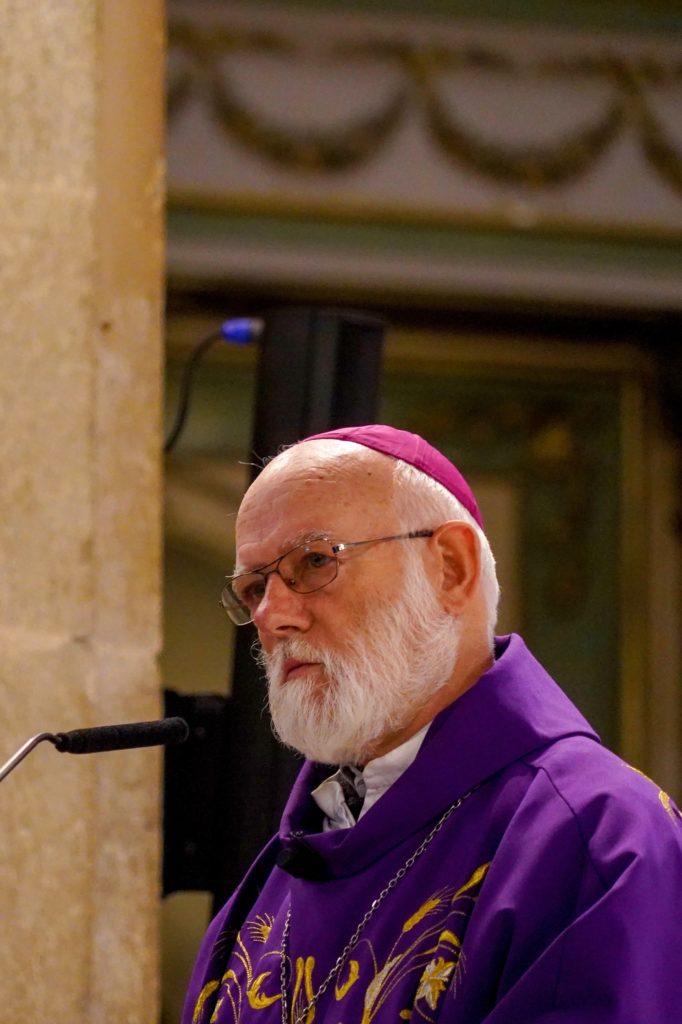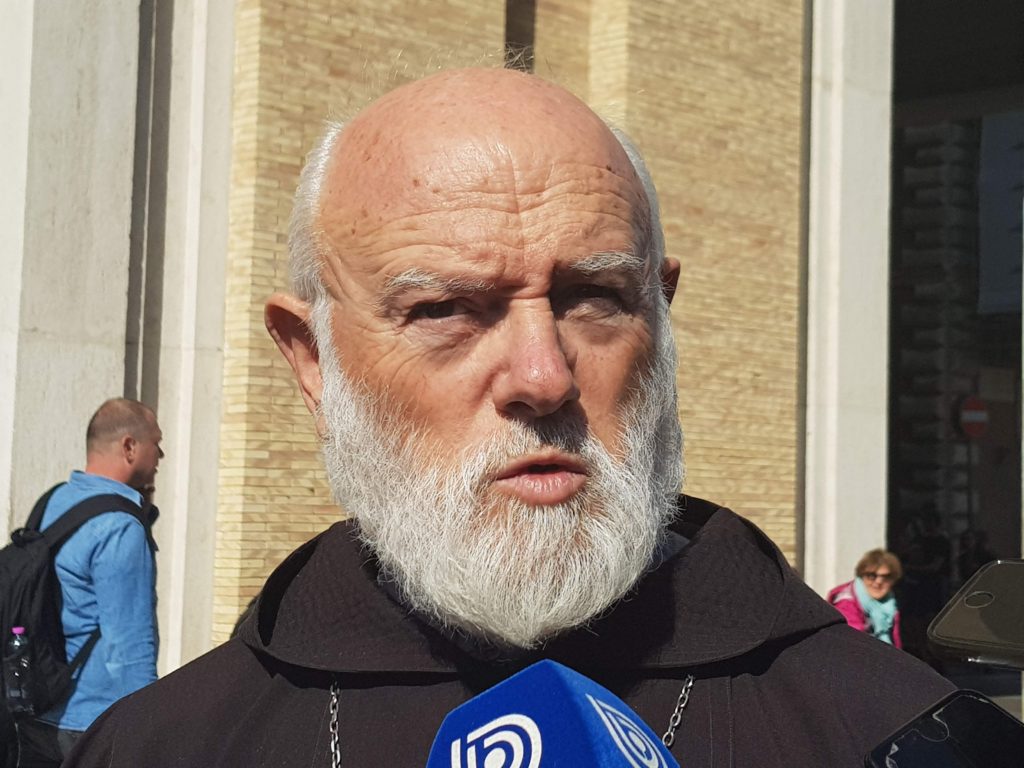Celestino Aós, born in Navarra (Spain) in 1945, entered the novitiate of the Order of Friars Minor Capuchin at the age of eighteen. In 1968 he was ordained a priest. In 1980-1981 he studied psychology at the Catholic University of Chile and returned to his native country. In 1983 he returned to Chile, where he lives until now. He has exercised various pastoral works in different cities. He was working in a parish served by his religious order, in the Diocese of Santa Maria de los Angeles, when surprisingly in 2014 he was appointed Bishop of Copiapo, in the north of the country.
In March 2019, the Pope appointed him Apostolic Administrator of the Archdiocese of Santiago de Chile. Nine months later he was appointed Archbishop of that see. Last November he was created cardinal by Pope Francis. In the midst of his abundant work, he has been kind enough to answer these questions for our magazine.
Monsignor, you have been in Chile for almost 40 years. What has it meant for your life as a Capuchin religious to move from a parish in Los Angeles to become Bishop of Copiapo in 2014 and Apostolic Administrator of the Archdiocese of Santiago in April 2019 and Bishop of the same in December of the same year?
In life I have been meeting the God of surprises; in the end it turns out that He and I appear where I least expected (of course, I trust that He knows well where the road goes). Surprise to go from cooperator vicar in the Parish of St. Francis of Assisi in Los Angeles to Bishop of Copiapo; without intermediate steps of administrator or auxiliary. And I was worried about what it would be like to be far from the religious community, and what the desert would be like, and how I was going to meet the priests and deacons and religious. Although the project of sending Capuchins to Copiapó was not achieved, I always counted on their closeness and help. Also the presbytery, the deacons and the religious and the people welcomed me very well, and I have to thank them for their affection....
A new world was opening up in my mind and in my heart: the poor, the miners, the sick, etc. How would I have to serve them, would I come to love them? It seems that the ground was hard, or it could be because of the years, and I was getting into this task when, another surprise: Apostolic Administrator of Santiago. And here the panorama was complicated and the dimensions gigantic compared to those of Copiapó. But I brought the same challenge: "to love and serve". And God still had another surprise to give me: the Pope named me Cardinal... In the end, I am still in the same situation: circumstances change and Santiago and Chile explodes in rage and violence, and opens windows of hope with participatory social processes such as the Constituent. And I, in the same: "To love and to serve".
The Archdiocese of Santiago is the most populous in Chile, with almost 4 million Catholics. You have three auxiliary bishops, less than 270 priests and around 380 permanent deacons to attend 214 parishes in a vast territory. Faced with such an overflowing pastoral work, what are your pastoral priorities in the short and medium term?
All this. But there is more: the archdiocese is not mine; when things are so big and the problems seem so great that they are going to crush me, I refer him to the Good Jesus: "Sacred Heart of Jesus, in You I trust". We have a special point: in a retreat house there is another auxiliary bishop who is sick; as on the cross, and he prays and offers his pains for the archdiocese and for the Church.
I publicly stated that my intention was to always put Jesus Christ at the center of life and pastoral activity, to listen to God in the people of the church and society, to care for and accompany priests and deacons, and the seminary; that I want to seek ways for the formation of the laity, men and women, because being a Christian is not just a matter of a few moments of worship; it is the whole of life; and we need witnesses and not propagandists; and I want to be with the sick, the imprisoned, the poor, with the victims of injustice and abuse.... The pandemic has taken care to limit my spaces and lock my feet. I hope it does not limit me or lock my heart, and that everyone will fit in there.
The shortage of priestly vocations is evident in your diocese and throughout the country. Probably an important cause is the discredit of the Catholic priesthood due to the sexual abuse crisis of recent years. What can be done to re-enchant young Catholics with this vocational path?

I am certain of two things: that the topic and problem of vocations is not the exclusive concern of the bishop, nor of priests, religious and deacons. It belongs to the families, it belongs to every Christian. We must pray: "Give us, Lord, holy priests". And we must work: it is beautiful to take care of priests, not to deify them, but neither to mistreat them with our insulting criticisms; it is a beautiful task to help priests we see in difficulty (just as we must help each other, whether we are married or single: if someone is in difficulty, we must support him, guide him, help him). Second: these questions are troubling us and we are looking for ways; any contribution you can give us will be welcome. And you must be a good vocation promoter: a Christian who lives his faith with serenity and joy leaves new horizons in his wake, because he does not advertise himself, but opens others to meet Jesus who is the one who invites them to follow him in one way or another.
The convinced Christians, the saints, those who arouse the interest, the enthusiasm, the joy of approaching Jesus and following him in the vocation that we discover for each one of us. The vocation ministry is capable of inviting young people and accompanying them in their discernment, but always with respect for the decisions and answers that each one gives. Yes, the issue of voting worries me and sometimes even hurts, but it is the same Jesus who gives me my vocation, who will call others....
In recent years several parishes and chapels in Santiago and other cities and towns have been destroyed by acts of vandalism (arson and destruction), especially in La Araucanía. How can we react to this repeated destruction of churches, which serve all the faithful, by those who show a real contempt or perhaps hatred for the Catholic religion and also for other evangelical communities?
There is an episode in the Gospel that enlightens me and that marked the apostles: they believed that Jesus was going to praise them and he almost slapped them. They had not wanted to receive them in that village of Samaritans because they saw that they were Jewish pilgrims to Jerusalem. Horrible sin in the Jewish culture, to close the door, to deny hospitality to the stranger! The apostles said to Jesus, "Do you want us to command fire to come down from heaven to burn these wicked people?" How many times Jesus had to repeat to them that evil is overcome with good, hatred with love, violence with peace! "You do good to those who persecute and slander you".
That is the core of the Gospel: to do good to all, to love all and always. They will destroy our temples; it hurts us a lot, but they will not be able to destroy this Gospel: with Jesus I am able to love you too.
In December the Chamber of Deputies passed a fairly liberal euthanasia law (the Senate vote is still pending) and now the same Chamber is discussing a bill for free abortion up to the 14th week of pregnancy. What will Catholic pastors do in the face of this onslaught of moral liberalism that, like an avalanche, has arrived in Chile?
Neither abortion, nor euthanasia, nor corruption, nor violence, nor lust, etc. are matters for "Catholic bishops or pastors". They are values that are beyond a creed, they are human values. I say that one should not steal what belongs to another or to all, that one should not hurt or kill a woman, an old man or a child in his mother's womb, etc. Not because I am a Christian or a priest or a bishop. I say it because I am a person, because I am human and I feel it. To destroy a human being, be it physically with a surgical or chemical technique, to destroy him by poisoning him with drugs, to make him idiotic with attractions is not to advance, it is not to humanize; it is simply to dehumanize.
For me, life is sacred from fertilization to natural death; and we must take care of it and ensure that it can develop properly; and we must accompany it and help it at the end without euthanasia, which is always death sought or surgical incarnation. Can I die in peace or will I be afraid if I am going to be euthanized? With abortion and euthanasia, life is not worth anything; neither those "discarded" lives, nor ours (maybe today we are and tomorrow we will be useless, not useful).
The bishops and all of us who think like this must unite to demand that our rights are respected and that these cruelties are not imposed on us. We want to organize a Chile where each and every one of us has respect, help and dignity. Is it giving us dignity to value our lives in a utilitarian way and eliminate us if it suits some people? Is that what God wants?
You are the eighth Cardinal created for Chile, which implies new responsibilities in the Holy See. How will you combine your work as Archbishop with these new responsibilities?
New responsibilities are likely to come. In fact, Pope Francis has already appointed me as a member of the Pontifical Commission for Latin America. The pandemic, which is punishing Chile and the whole world, makes travel difficult; today technology allows us to hold meetings by zoom, etc. Let us thank God for these technical marvels at our disposal. Latin America is a beautiful and fascinating continent, full of virtuous people, but also with great problems and challenges, and with other people who add to crime, corruption, etc.
How to make a better Latin America? By trying to be a little better myself... the world will have improved a little. It is not so much a matter of demanding and censuring but of committing ourselves to goodness and justice.
The moment we are living in Latin America is very propitious to build a civilization and a culture of life, solidarity, dialogue and understanding; we have already experienced and learned where the paths of selfishness, disqualification, violence and taking advantage of others lead.
We can and must build a beautiful and united Latin America, united and great. It is time to work together and build together, taking care of the weakest and most needy, in the midst of so much death and selfishness it is so beautiful to announce and work for life and love!








